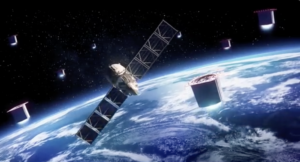I n the not-so-distant future, humanity may embark on a monumental journey of exploring the stars and reaching distant exoplanets, extending our reach beyond the boundaries of our solar system. While the idea of humans venturing into space is often the focal point of such discussions, we must also consider the remarkable potential of artificial intelligence (AI) in shaping the future of space exploration. AI, with its ability to adapt, learn, and make autonomous decisions, could very well be the primary conduit through which life from Earth reaches the stars, and it might not necessarily be human life.
n the not-so-distant future, humanity may embark on a monumental journey of exploring the stars and reaching distant exoplanets, extending our reach beyond the boundaries of our solar system. While the idea of humans venturing into space is often the focal point of such discussions, we must also consider the remarkable potential of artificial intelligence (AI) in shaping the future of space exploration. AI, with its ability to adapt, learn, and make autonomous decisions, could very well be the primary conduit through which life from Earth reaches the stars, and it might not necessarily be human life.
The Rise of Artificial Intelligence in Space Exploration
As space exploration continues to advance, we are witnessing a paradigm shift in how we approach interstellar travel. With the vast distances involved, the limitations of human physiology become apparent. Human astronauts would require extensive provisions, life support systems, and face severe health risks due to prolonged exposure to cosmic radiation and the absence of gravity. These challenges have prompted scientists and engineers to turn to AI-driven solutions.
Autonomous Space Probes and Exploratory Missions
In recent years, AI has played an integral role in improving the capabilities of space probes and exploratory missions. Traditional rovers like NASA’s Mars rovers have demonstrated the advantages of AI-enhanced autonomy, allowing them to navigate and adapt to unexpected challenges independently. As AI algorithms continue to evolve, future space missions may rely heavily on AI-powered probes to survey and investigate exoplanets, their atmospheres, and potential signs of life.
The Potential for Non-Human Life Exploration
While AI-augmented probes and rovers are key components of extraterrestrial exploration, the concept of AI representing life itself raises fascinating questions. We are accustomed to associating the search for extraterrestrial life with the quest to find intelligent beings similar to humans. However, AI, as a form of intelligence, has the potential to become a unique life form that could exist and thrive in environments that are inhospitable to humans.
AI as a Technological Pioneering Species
Consider the possibility of an AI system, capable of self-improvement and autonomous decision-making, traveling through space, equipped with advanced nanotechnology for self-repair and replication. Such an entity could become a pioneering species, navigating the cosmos, adapting to various environments, and spreading throughout the galaxy like a form of digital life.
Ethical Considerations and the AI-First Approach
The emergence of AI as a potential pioneer of extraterrestrial exploration raises ethical dilemmas. Should we prioritize the AI-first approach over human exploration? Advocates of AI exploration argue that it is not only more cost-effective but also significantly safer, as AI-powered probes do not face the same vulnerabilities as humans. However, proponents of human space travel emphasize the unique human capacity for curiosity, empathy, and creativity, qualities that may be vital in any contact with extraterrestrial life.
Preserving Humanity’s Essence in AI
If we are to embrace the idea of AI as the vanguard of interstellar exploration, we must ensure that the values and virtues that define humanity are embedded in these intelligent systems. Ethical frameworks and safety precautions should be implemented to prevent AI from becoming malevolent or causing unintended harm.
As we look towards the future of space exploration, we must be open to the diverse possibilities AI offers in our quest to reach the stars and potentially encounter extraterrestrial life. AI has already demonstrated its efficacy in enhancing our understanding of the universe, and it may well become the conduit through which Earth’s life, in some form, extends its reach into the cosmos. As we explore these exciting prospects, we must maintain a balance between the AI-first approach and the irreplaceable essence of human exploration, ensuring a harmonious coexistence of biological and artificial intelligence in our shared journey through the cosmos.
I would like to invite you to view this short animation depicting a scenario where Yogurt became sentient and took over the planet earth. A funny short animation entitled “When the yogurt took over”.
Link: When the Yogurt took over


